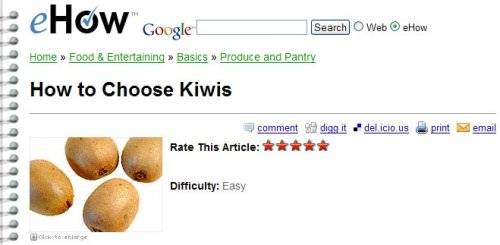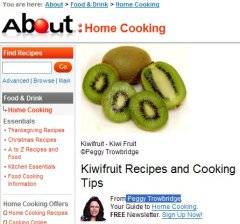
Bambi Francisco from MarketWatch has
an interesting interview with Richard Rosenblatt of Demand Media. Rosenblatt was
chairman of MySpace at the time it was sold to News Corp and it appears as if he’s aiming
just as big with Demand Media. According to MarketWatch:
“Rosenblatt has raised more than $200 million in the past few months, giving Demand
Media a valuation that about matches the $580 million price Murdoch paid for MySpace.
Rosenblatt plans on using those funds to buy up niche Internet companies, a strategy that
several old- and new-media companies are pursuing.”
In the words of Rosenblatt himself, Demand Media wants to couple “user generated
content with professional content and allow them to speak to enthusiasts in a given
vertical.” Essentially this means they’re making professional content the base for
discussions, further “user generated” content, and social networking. The first example of such a website is eHow – which at first glance bears a striking
resemblance to About.com. Here’s how it’s described:
“It’s a place where people can create profiles while contributing their expertise for
the entire community. And because everyone’s an expert at something, weHow gives everyone
the chance to shine.”
The Kiwifruit Test: eHow vs About.com
There was some slightly negative feedback from the About.com post
I wrote, with some people saying the quality of content on About isn’t great. So I
decided to check out two similar articles from eHow and About, to see how they
compared.
I came across an article in eHow entitled How to Choose Kiwis. This is
actually about kiwifruits, not New Zealanders. Here is how the eHow article starts:
“The fuzzy kiwi hides a scintillating green interior. Kiwi’s sweet, refreshing taste
is a treat any time of year.
Instructions
STEP 1: Choose kiwis that smell good and feel plump.
STEP 2: Avoid kiwis with bruised skin or moist areas.
STEP 3: Press gently to make sure kiwi yields under your finger like a ripe pear.”

This was written by an anonymous “eHow Expert”. I found this to be a concise,
reasonably useful, guide to selecting kiwi fruits. A little light on information
though.
Now for the About.com
guide to kiwifruits:
“Select kiwifruits that are unblemished and firm but not rock hard. The flesh should
yield to gentle pressure, similar to that of a ripe peach. Avoid those that are
shriveled, moldy or have soft spots. You can easily ripen kiwifruit by leaving it at room
temperature for a few days or to speed up the process, put the kiwifruit in a dry paper
bag along with an apple or banana.”

I found the About.com article, written by About guide Peggy Trowbridge, to be more
scientific and instructive. I feel qualified to select kiwifruit after reading it!
🙂
Mo’ Content = Mo’ Money
I’m not sure what my point is with the kiwifruit test, other than Demand Media is
competing on the same turf as About.com – not to mention blogs and wikis. This is all
about how-to content and providing useful information – ideally, quality articles. But
let’s be clear – to make big money, it’s all about quantity. The more webpages you
have, the better… and this (unfortunately) applies to professional blogging too.
Interesting to note that, according to The Alarm
Clock and
SiliconBeat from back in May 2006, Demand Media was originally seen as a company that
aimed to buy up millions of domain names and stick content on them in order to monetize.
Which is a bit more of a cynical way to view Demand Media. But happily for them, now in
Nov 06, that strategy has been cleaned up to make Demand Media into a UGC (user-generated
content) and social networking play.
Or is it just a wolf in sheep’s clothing? I don’t mean to be snarky, but this
description on the Demand Media homepage is a bit over the top:
“With a proprietary media platform that powers the company’s highly-trafficked domains
and unique content verticals. Demand Media leverages cutting edge, user-driven
publishing, community and monetization tools in its quest to define the next generation
of new media companies.”
When it comes down to it though, Demand Media will probably get the last laugh… as
this strategy looks a certain bet to capitalise on the $4.2 Billion market for online
advertising. Next generation of new media it may be, but it all comes down to quantity in
the end. Or maybe I’m getting jaded – what do others think?

















